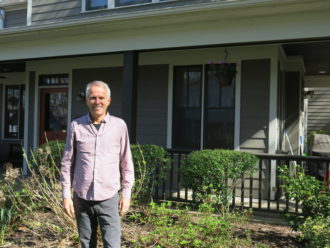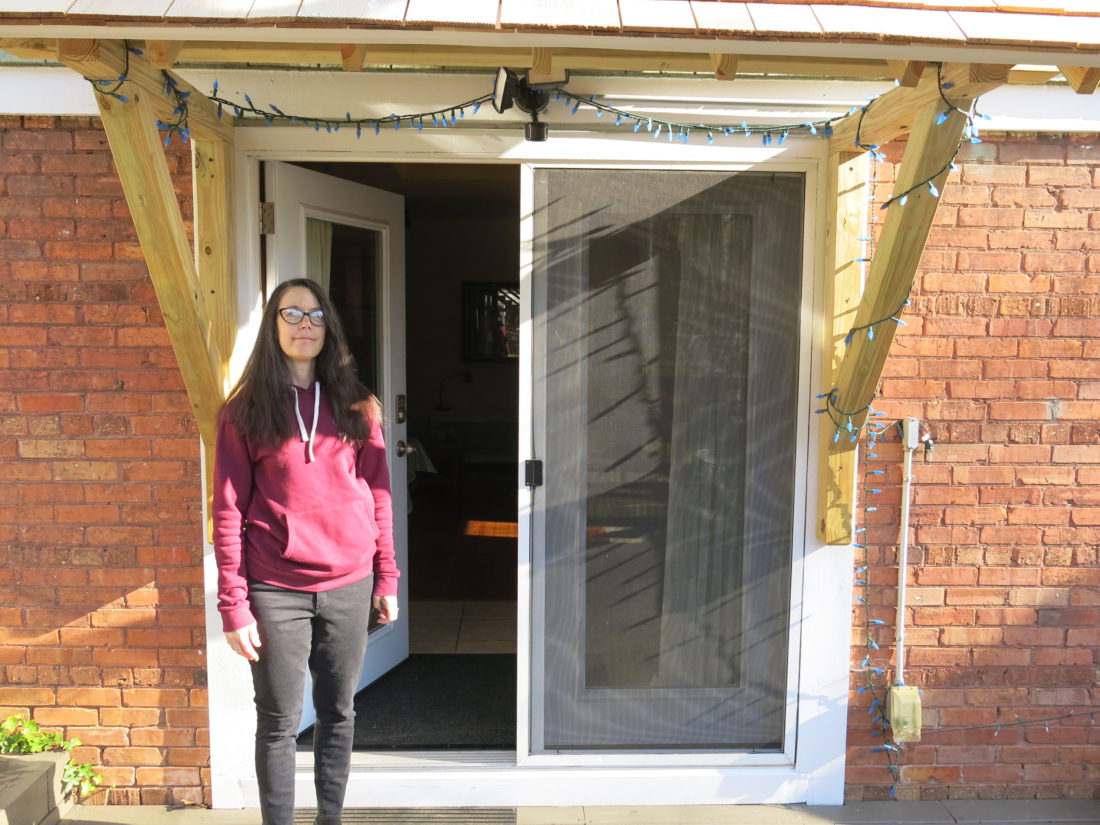Just last month, Naomi Palmer thought she was being paranoid when she worried about entering her basement, where paying guests regularly stayed. At the time, the West Asheville resident and Airbnb host had just seen her latest visitor check out. And though Buncombe County had yet to announce its “stay home, stay safe” mandate, cancellations were pouring in from concerned travelers fearful of catching COVID-19.
With no new arrivals scheduled, Palmer figured she could postpone cleaning the rental space. But then she remembered the cut flowers and potted plants, which would rot or die without watering.
Slipping on a pair of gloves, she descended the familiar stairs into a space that suddenly felt strange and threatening, and quickly attended to the plants. Additional cleaning, she decided, could wait a few more days to give any trace of the coronavirus that might still be lingering there plenty of time to dissipate.
But as experts continue to offer new information about how the virus spreads, Palmer now has a different take on her experience. “You feel like you’re being obsessive-compulsive, but actually it’s what they’re saying you need to do,” she observes. “It’s hard to adjust to it, but I think everyone is going through that.”
Health and safety considerations aside, though, Palmer and other local hosts are also facing a complete loss of revenue due to the county’s ban on short-term rentals for leisure travel.
Prior to the pandemic, Palmer’s rental, which accounted for most of her income, was bringing in anywhere from $875 to $2,300 per month. She also worked part time for a local food company, but that job, too, is now gone.
Despite the challenges, however, Palmer says she considers herself lucky: Her husband is still employed, and they and their two teenage sons are all healthy. Nonetheless, she does worry. “I wonder how much we’ll have to eat into our savings,” Palmer explains. “We’re getting older, and that was supposed to be for the future.”
Scrambling to adjust

Many of her fellow entrepreneurs now find themselves in similar straits. In a 2018 survey conducted by the Asheville Homestay Network, 72% of respondents said they relied on their short-term rental to help pay their mortgage. Meanwhile, 41% said they’d probably have to move if they lost that rental income.
“We knew that there was going to be a slowdown in the economy at some point,” says Jackson Tierney, co-founder of the network. “So we were concentrating on improving and getting ready for the rainy day. But unfortunately, things came quicker and more severely than anyone had anticipated.”
On March 8, several weeks before the county’s March 26 mandate, Tierney sent the network’s 1,000 online subscribers a bulletin describing best practices for cleaning Airbnbs during COVID-19. A record 65% of recipients actually opened the email, he says.
“We were very careful not to hold ourselves as experts,” stresses Tierney. “We tried to be very clear, saying, ‘Hey, here is some information, but the science is changing just about every day based on what people learn. Don’t put all your stock in what you’re reading here.’”
Mere weeks later, however, the network’s April 1 newsletter showed an entirely different focus. In the wake of the county mandate, Tierney concentrated on giving members an overview of possible financial relief available from local, state and federal sources.
The newsletter also outlined the major talking points from Airbnb CEO Brian Chesky’s March 30 videoconference with hosts. The company, he said, would pay hosts 25% of their anticipated earnings from reservations made on or before March 14 for lodging between March 14 and May 31 that has since been canceled. Those payments, however, will be based on whatever cancellation policies each host had in place at the time the reservation was made; those with less stringent policies will receive little or no compensation.
Airbnb has also established a $10 million relief fund for what it calls “superhosts” — those whose performance meets certain benchmarks for excellence. The fund provides grants of up to $5,000 to those who qualify. For more information, visit avl.mx/71q.
Responses vary
Besides providing financial information, the Homestay Network’s April newsletter included stories about how local hosts were dealing with the situation. Some said they were letting family members or friends self-quarantine in the currently unrentable space. Others expressed gratitude for their own good health and well-being. On a more philosophical note, one host contemplated nature’s transformative cycles, suggesting that the earth might be entering yet another death/rebirth stage.
“There are a lot of folks who are very mindful of the community and nature and meditation and other things,” notes Tierney. “So a lot of people … are using this time to just get into a different rhythm.”
But not all local hosts appear to be honoring the current restrictions. On April 7, the Asheville Police Department issued a press release seeking help in locating Shawn Thomas Johnson, who’s accused of repeatedly leasing his short-term West Asheville rental in violation of the ban. Johnson turned himself in later that day.
Following his surrender, Johnson posted on the Asheville Airbnb Hosts Facebook page, suggesting his guests were essential employees, which lodging operators are permitted to house during the mandate. Johnson confirmed these comments in an email exchange with Xpress.
However, Christina Hallingse, spokesperson for the Asheville Police, maintains that Johnson was cited for repeatedly renting to nonessential travelers, a Class 2 misdemeanor under current restrictions. Though Johnson is currently the only Buncombe County resident formally accused, Hallingse says the Asheville City Police is investigating other potential short-term rental violators; an exact number was not available at press time.
“It’s not our intent to criminalize those who do not comply, but rather to educate individuals on the intent of the order with a warning or advisement,” writes Hallingse in an email exchange with Xpress. “However, if the behavior persists APD will consider the use of citations to gain compliance.”
Looking to the future
Richmond Hill resident Leanna Echeverri says she and her partner are complying with current regulations and doing what they can to stay positive during the pandemic. . After investing about $5,000 in renovations to create a private entrance and space inside their home, they launched the short-term rental in March 2019.
“Almost immediately, we were booking like crazy,” Echeverri recalls. But a year later, everything has drastically changed. Her seven April reservations, spanning 21 days, have all fallen by the wayside. Those rentals were Echeverri’s main source of income; her partner works at Whole Foods Market.
Making matters worse was the fact that, even before the pandemic kicked in, 2020 had begun with a low occupancy rate.
“We kind of trudged along during those winter months,” Echeverri explains. “We saved money to get us through … and planned to play catch-up when March and April came around. … But that’s been pulled out from under our feet.”
Still, Echeverri recognizes that the current situation also has its benefits. Because she has asthma, she constantly worried about housing guests in her home. “I’m an at-risk person,” she explains. But with travel now prohibited and no future guests in sight, Echeverri no longer has to choose between her financial and physical well-being: The decision has been made for her.
Meanwhile, she and her fellow hosts are also keeping busy contemplating ways to boost their prospects once the travel restrictions are lifted. While some believe the tourism industry will bounce back with ease, others, including Tierney, predict that most folks “are still going to be extremely cautious about traveling.”
For this reason, he’s looking to fine-tune his marketing strategy to assuage any lingering concerns. One approach Tierney’s considering is offering rentals only on weekends. Creating a buffer of four to five days between guests sends a “physiological message,” he says, reassuring travelers that their health and safety are the host’s top priorities.
Another strategy is emphasizing how relatively limited Airbnb guests’ exposure is. “Hotels have common spaces, elevators — the types of things that may cause pause,” Tierney points out. And while he expects that travelers will eventually return to their preferred form of lodging, “They may have a near-term preference for the type of space that we offer.”
Back at their Richmond Hill home, however, Echeverri and her partner aren’t looking that far ahead. Instead, she says, they’re taking their cue from singer Lukas Nelson (Willie Nelson’s son) and his band Promise of the Real, which recently released an album titled Turn Off the News (Build a Garden). “We’re not watching the news, and we’re building a garden,” she reveals. “I have no control over the situation, so I’m doing my best not to stress about it, because that will lower my immune system. I’m trying to be calm and approach each day one day at a time.”




There’s a lot of speculation w/in the Real estate investors that these highly leveraged airbnb’s are going to eventually get absorbed
What does that mean? Absorbed by who? Or what. The Blob? The anti-bodies in Fantastic Voyage? What?
Absorbed by the above mentioned investors
STR’s are continuing to rent. I’ve noted several and reported them. Everyone should. When reported, the city needs to act or what’s the point?
Because minding your own business is pointless too. It’s why the culture of distrust flourishes. No better example than neighbor turning neighbor in.
I have no neighbors. I have an illegal in-city-limits-whole-house-airBnb rental that has been in full swing for two or three years with a “homestay” permit. I have carloads of people from New York, Georgia and Florida that arrive every 2 to 5 days, unload their trunk full of groceries and proceed to party and walk around the neighborhood the minute they get here. The “stay home orders” have actually improved living next door to an illegal STR as there is nowhere for them to go at night so they don’t come home at 2 am and party on the deck until 5. There’s a silver lining in everything.
I don’t feel sorry for STR operators. If times are tough they can sell their property, take out a HELOC on it, rent to a long-term tenant, or wait it out and resume STRs when this is all over. May I suggest getting a job?